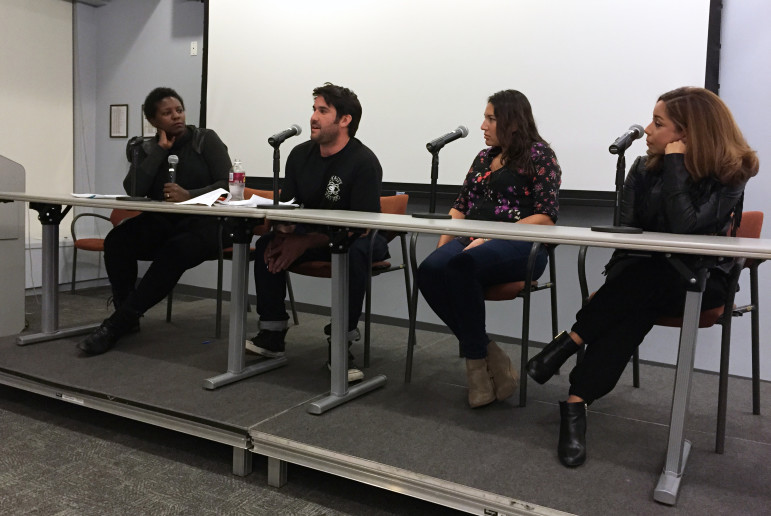
(Left to right) Yoruba Richen, director of the City University of New York Journalism School’s documentary program; Daryl Khan, CUNY adjunct professor and head of the Juvenile Justice Information Exchange New York bureau; Alissa Figueroa, director of "Prison Kids" and Alcione Gonzalez, associate film producer.
NEW YORK — She was 11 and in the sixth grade when she went to jail, eventually landing in solitary confinement. Nicole never imagined a petty fight at her Louisiana middle school would lead to years behind bars.
“They really made me feel like I was a bad person,” Nicole said softly. “They tried to treat me like I was a criminal for real.”
Nicole, who still has an easy smile, was one of several children in the Fusion documentary “Prison Kids: A Crime Against America’s Children” screened Tuesday night at the City University of New York (CUNY).

With graphic images of a South Carolina school officer throwing a girl out of her desk and into a classroom wall fresh in their minds, the audience arrived wanting to know what they could do to end violence against children.
According to “Prison Kids,” nearly 60,000 children are incarcerated in the United States. The film follows a few of the many struggling to overcome a system many consider grossly unjust.
In the Jefferson Parish School district, where Nicole’s story began, the Southern Poverty Law Center (SPLC) filed a civil rights complaint. According to the complaint, though black students made up 41 percent of the district’s population in 2014, they accounted for 80 percent of its arrests.
[Related: What Science, Common Sense Tell Us About Kids and the Law]
Thena Robinson-Mock, civil rights attorney with the Advancement Project, a national civil rights organization, says in the film that race plays a huge factor. "Childhood innocence is not afforded to black students."
Judge Elijah Williams, a juvenile judge in Florida, comments in the film, “Our legal system was designed by people who are white, wealthy and highly educated. So my challenge every day as a judge is to make this system work for people who are of color, who are not as educated and who are not as wealthy.” Williams, who is black, see himself reflected in those who pass through his courtroom.
The documentary also spotlights an Ohio youth: Allen was sent to prison at 15 and suddenly found himself a situation similar to Nicole’s. One year he spent a whopping 313 days in solitary confinement. “I used to pace a lot, pace back and forth, just looking back and forth, pacing,” he said.
While incarcerated, Allen was diagnosed with a mood disorder and ADHD. Like most in his facility, he was put on strong medication to keep him calm and thrown back in solitary.
“Instead of understanding what was going on with these kids, they were punished, they were put in solitary confinement,” says Dr. Stuart Grassian, a psychiatrist and expert on the effects of solitary confinement.
“Once a prisoner gets into solitary confinement, usually because of impulsive and emotionally volatile-type behavior, they get worse,” Grassian says in the film.
A panel discussion after the screening focused on ways to change policies and get kids the treatment they need. Speakers included “Prison Kids” director Alissa Figueroa; associate producer and CUNY Journalism School alumna Alcione Gonzalez, and Daryl Khan, CUNY adjunct professor and New York bureau chief for the Juvenile Justice Information Exchange. The panel was moderated by Yoruba Richen, Tow professor and director of the CUNY Journalism School’s documentary program.
Figueroa said lawsuits are often what it takes to make change, citing Ohio as an example. After multiple lawsuits, she said, incarceration rates there have dropped dramatically and more than half of the kid prisons are closed.
“It’s never been legislators deciding on their own to change something, it’s always been groups suing or threatening a lawsuit,” said Figueroa.
Khan agreed, saying journalism like “Prison Kids” is also part of the solution.
“This shows you the power of journalism to do good,” he said of the film. “The reason these lawsuits happen and not legislation is because people don’t give a ---- and the reason people don’t ... is because they don’t know. And so you have these obscure lawyers doing all of this heavy lifting instead of us.”
Panelists all said the system urgently needs to change, something Nicole’s mother emphasized in the movie.
“Help these children while they have a chance,” she said, “While they’re still young and there’s still a chance for them.”
Click here to watch “Prison Kids: A Crime Against America’s Children.”
More related articles:
U.S. Should Adhere to Global Standards in How We Treat Our Youth
OP-ED: Students Help Keep Juvenile Court and Other Youth-Service Providers Honest
Juvenile Defense Attorneys Badly Need Specialized Training, Higher Fees
In PA the Judges rely heavily on the Probation Officers recommendation as to what they feel is in the best interest for the juvenille. Probation states they make their recommendation based off of the evalutions the juvenille received however in my experience they pick and choose when they want to go with the evaluations recommendations. When asked how they choose what facility to place the juvenille in I was told they pick from a list. There is no interest in helping the juvenille or their family which is one of the responsibilities they have as a probation officer. The only interest they have is keeping juvenilles from being successful, keeping them in a system that is broken and is not protecting the public but giving them a false sense of protection and harming the kids.